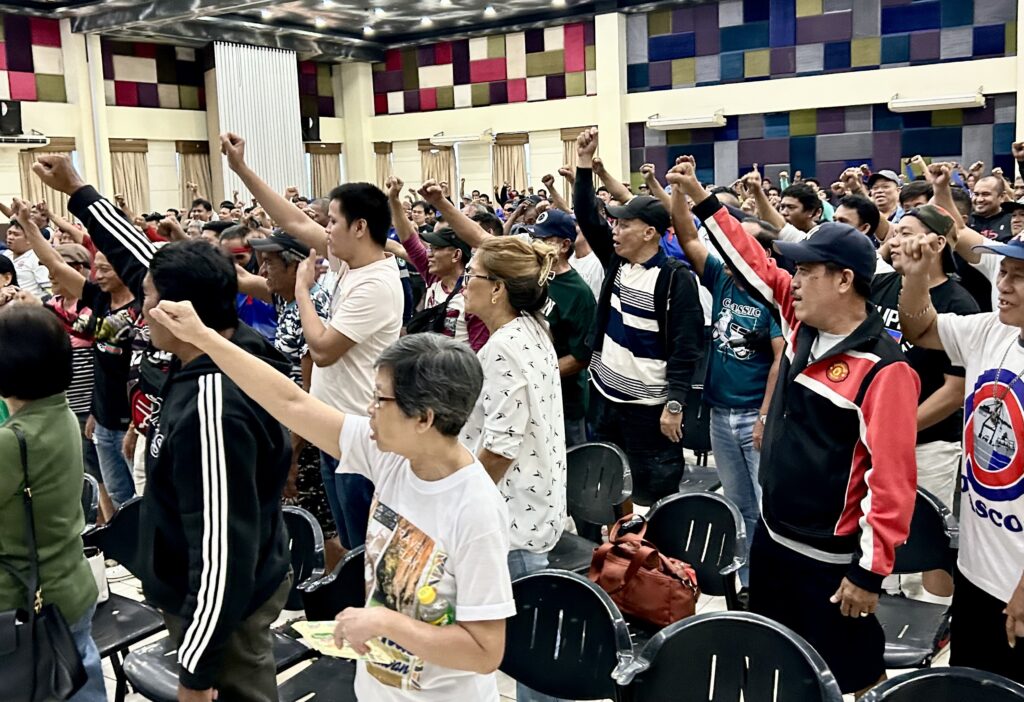
Over a hundred workers, retirees, and shareholders of the Oriental Port and Allied Services Corporation (OPASCOR) are calling for Lawyer Tomas Riveral, the chief executive officer, to step down and vacate his position on Tuesday, September 17.
CEBU CITY, Philippines — The National Conciliation and Mediation Board (NCMB) has scheduled a mediation conference on September 23, 2024, in response to escalating tensions at the Oriental Port and Allied Services Corporation (Opascor).
This comes after over 200 employees, retirees, and shareholders petitioned for the immediate resignation of CEO Lawyer Tomas Riveral and General Manager Florimae Velasco on September 17. They accused them of mismanagement, conflict of interest, and neglecting their duties to the workforce.
Notice of strike filed
On September 19, Dennis Arciega, president of Local 1 Union and barangay captain of Tinago, Cebu City, filed a notice of strike against the management, citing unfair labor practices.
READ MORE:
Opascor workers, shareholders urge CEO Riveral to step down
PPA set to start crafting ports development plans
In his complaint, he referenced the violation of Article 259 (e), which involves discrimination regarding wages, hours of work, and other terms and conditions of employment aimed at discouraging union membership.
He also pointed to the failure to implement Article IV, Section 1 (a) – (b) of the Collective Bargaining Agreement (CBA) and raised concerns about union busting, accusing the management of actions intended to undermine or dissolve the union.
The petition, filed on September 17, called for the two top officials to step down, claiming that their continued leadership could cause “further damage” to the company.
The scheduled mediation will be held at the Department of Labor and Employment (DOLE) regional office, where both Riveral and representatives from the workers, retirees, and shareholders will meet to discuss the issues outlined in the petition.
Mediator Rosemarie Oxinio will preside over the discussions, which are expected to tackle allegations of corporate mismanagement, nepotism, financial opacity, and failure to hold elections for board members in over two decades.
READ MORE: Gov’t seeks ₱40.5-B investment in 17 ports
Change in Opascor leadership sought
“Ania mi karon, nisyagit tungod sa pagpanlugpig, dili na maayo og pagdala sa management,” Arciaga said on Sept. 17.
(We are here, shouting because of being looked down, it is now not being managed well by management.)
He highlighted the frustrations of the workers, who feel sidelined by a leadership they claim has operated without accountability for years.
Arciaga noted that many workers, retirees, and shareholders had long felt marginalized due to the absence of elections for board members, which were mandated by law to occur annually.
Conflict of interest
The petitioners accused Riveral of allowing personal business interests to interfere with Opascor’s operations, citing a conflict of interest involving his family-owned company, ZRI, which had conducted business with Opascor.
The petition also pointed to the appointment of unqualified family members to key management positions, fueling accusations of nepotism and contributing to the erosion of trust within the company.
In addition to concerns about transparency and corporate governance, the petition outlined how the company’s failure to disclose financial statements had left workers and shareholders in the dark regarding Opascor’s true financial standing.
The withholding of critical financial data, alongside the alleged misappropriation of real properties, has only deepened the rift between management and its stakeholders.
Opascor, which provides stevedoring and cargo-handling services at the Cebu International Port (CIP), plays a crucial role in the local economy.
Workers complaints
However, according to the petitioners, its workers have suffered from a lack of wage increases, reduced overtime opportunities, and inadequate support for retirees, all while the company’s leadership had been accused of indulging in lavish spending on personal projects.
“Ang gipaabot sa mga retirees ug mga mamumuo nga dapat mag-election gyud kay sa balaod kada tuig man,” Arciaga added.
(What the retirees and the workers are waiting is that there should be an election that will be held every year.)
He further stressed the need for democratic elections to restore workers’ and shareholders’ confidence in the leadership.

